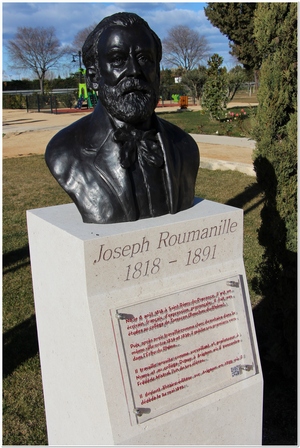
Joseph Roumanille
This french writer uses the language of Provence and is one of the 7 founders of the "Felibrige", along with Frédéric Mistral, Théodore Aubanel, Anselme Mathieu, Paul Giera, Jean Brunet and Alphonse Tavan.  |
 |
| Version provençale | French version |
Famous journalist and poet, he actively participated to the rebirth of the provencal language , especially after the opening of his library, place that was the heart of the provencal culture rebirth.
 Joseph Roumanille was sent to the college of Tarascon in order to learn Latin and to become a priest as did all elders of catholic families at that time. He was an advanced student in Latin as well as in french and provencal language.
Joseph Roumanille was sent to the college of Tarascon in order to learn Latin and to become a priest as did all elders of catholic families at that time. He was an advanced student in Latin as well as in french and provencal language.It seems to be at this moment that he got passionate with the last.
After finishing his studies, he didn’t want to take the Holy Orders of the Catholic Church and left for Nyons to earn a living.
There, he met Hyacinthe Dupuy, Camille Raybaud and Barthélemy Chalvet, who were provencal poets. This little group of writer became what Frederic Mistral called "The birth place of the Felibrige".
Joseph Roumanille left Nyons in 1845 to enter the Dupuy's boarding school in Avignon where he worked as a repeater master. There, a friendship started with one of his students, Frédéric Mistral, who he surprised as he was writing poetry in provencal language.
Despite the difference of age and the teacher/student relationship they will stay together and be at the origin of the Felibrige.
At that time, and in the same boarding school, another "Felibre" was also studying: Anselme Mathieu...
Joseph Roumanille started to work at the Seguin printing company and took advantage of the situation to edit "Li Margarideto" (Daisies) in 1847. This small book of provencal poetry in four parts (one for each season) shows Joseph Roumanille's will to address himself to people understanding the "Lango Nostro" (provencal language).
But at this time, Roumanille spoke about the provencal language as being close to a dead language.
He continued to write verses in provencal language and published his writtings in 1859, inside the book "Li Flour de Sàuvi" (Sage flowers).
In 1884, Roumanille wrote "Li Conte Prouvençau" and of "Li Cascarelato".
He had a major role within the literary community of Provence, as he was at the origin of the provencal language rebirth. He devoted the 30 last years of his life writing stories in "L'Armana du Félibrige", stories that will make of Roumanille the worthy successor of our best story tellers from the Middle Age and from the Renaissance.
Roumanille will stay in history, as the "Father" of the Félibrige. His story "The curé de Cucugnan", will be used by Alphonse Daudet, creator of the modern provencal prose.
He died on May 24th 1891, leaving to history the memory of an essential actor in provencal culture development.